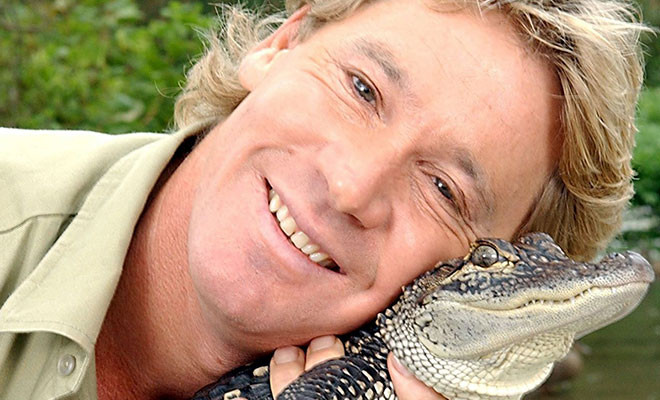
Steve Irwin and Self-Actualisation
In the last couple of months, millions upon millions of people around the world have been stunned at the untimely early death of Australia’s Crocodile Hunter, Steve Irwin. I was in Sydney when the news of his death came and the very night I returned to Colorado (Sept. 19), I sat and watched the entire Memorial Service at the Australia Zoo, a most emotionally moving memorial— one viewed by over 300,000 people!
One camera shot was replayed several times that I really loved. I had seen it before, but then Michelle Duval said to me, “Now that’s an example of self-Actualisation, don’t you think?” Thereafter the clip of Steve Irwin has taken on completely new meaning for me. The scene was of an interview where Steve was asked about wildlife and conversation. In response, Steve spoke in is special and usually animated way:
“This is my purpose!” he said in his uniquely passionate way raising his voice and gesturing with his hands. “This is my job, my mission — the reason I was put on this planet was to save wildlife!”
Here is a passionate explanation as to why he did what he did. And this sense of purpose and this sense of passion lies at the very heart of self-Actualisation. Abraham Maslow discovered this through his years of research of self-actualizing people. Such individuals do not live to just get by, to just make money, to just feel safe, to just have friends and approval, nor even to just be respected, they live for something bigger, something grander.
That’s why the Hierarchy of Needs diagram of Maslow’s which has been popularized all over the world in books on motivation, communication, psychology, management, leadership, coaching, etc. distinguish two levels of needs, the lower and the higher needs. And while everybody knows that, few seem to recognize that there are two completely different mechanisms driving each. The lower needs are driven by deficiency. That is, we feel the need and drive of them when we experience lack—deficiency. This makes us needy. And desperate! Then we have to have air, food, water, safety, belonging, self-respect in order to be okay.
How different are the higher needs, the needs that are actually the self-Actualisation needs. They are driven by abundance. Maslow called them the expressive needs because they are not about getting anything, but expressing who and what we are. And that’s what is so refreshing and amazing in Steve Irwin’s life. Within the natural passion that he expressed about the things that mattered most to him there was that genuine and authentic sense of the sheer joy of expressing the wonder and beauty of wild life.
As I reflected on all of this, I realized also that in terms of the two key variables in self-actualizing, meaning and performance, Steve Irwin’s life provide us such a great example of the very process of self-actualizing.
After all, here was a man who early in life discovered his passion and then devoted his life to following that passion. Somewhere and somehow he discovered along with his love for, that he had a natural talent, an uncanny sense of animals— how they feel, how they “think”and respond, and how to work with them. I’m sure he picked up a good bit of that from his dad, Bob Irwin, who was himself a conservationist and had created the Queensland Reptile Park which Steve later transformed into the Australia Zoo.
So my guess is that he became increasingly skilled at what he did best precisely because over the years he kept giving this more and more meaning. And so as he spent time in the outback and learning how to deal with crocodiles, the skills that he could perform became refined. And the larger picture is that he transformed the richness of his vision and understandings (the meanings that were rich to him) into his competency in working with animals (his actual performance).
Eventually this led to his video recording himself out in the wilds capturing a crocodile. With that he discovered yet another natural talent; communicating his enthusiasm about working with wild animals. And that, of course, opened up yet more opportunities, opportunities for doing documentaries and then television interviews. And with success and recognition came money and tremendous publicity and in all of that, he continued to translated his vision into effective performance as he created the Australian Zoo and brought up thousands of acres of outback for conservation.
And in actualizing his talents and meanings, he created his own unique way of being passionate about life, being authentic (“true blue”) to what mattered to him — his wife and children, his animals, and his leadership in fighting for conservation. The testimony of all who knew him speak of these things, especially his authenticity, that what you see is what you get. That it wasn’t about him, his ego, it was about the vision, the meanings, the performances.
And if you’ve ever seen Steve in his documentaries, commercials, or interviews, you have seen and heard a very passionate man—a man totally in love with life, with animals, with what he was engaged in. Did he experience the “flow” state? Did he step into a genius state of total engagement and focus? Did he have control over being totally present in his engagements? From everything that I have seen, everything indicates that he did, and did regularly.
And did he fully enjoy and delight himself in those genius states of focus? The glow of his face, the sparkle in his eye, the excitement in his voice, his gestures, etc. all speak of that. And that, of course, is the feel of self-Actualisation, the inherent happiness of living your potentials and of actualizing your best.
Self-Actualisation is living your life true to yourself—to your gifts, talents, loves, passions, and opportunities. Who would have thought that a young boy loving to hike in the brush and wrestle with crocodiles and wanting to save wildlife would have over a short 44 years create such a world-wide influence? At the memorial, Prime Minister of Australia John Howard described Steve Irwin as a great Australian ambassador. And actor Russell Crowe, a mate of Steve’s, commenting on the world-wide response, said, “How many Zoo keepers can claim that?”
Steve’s objective was not to be a hero to 500 million people around the world, it was just to follow his passion of saving wildlife. And that’s a great example of what living in the being¬-needs (Maslow) and simply expressing your passions can do.
So as we honor Steve Irwin’s memory, my suggestion is that we use him as a contemporary model of self-Actualisation. Would you like to actualize your highest and best skills and potentials? Then take some time to turn inward to discover what you’re truly good at, what excites you, what natural dispositions and talents that are yet only in potentiality that you could turn into a skill. Once you find that the adventure of life truly begins. And what is that adventure? It is following your passion. It is making your passion, what’s uniquely important and exciting to you —your very life and your contribution to the world that makes a difference.
Of course, do I also need to comment that this is the heart and soul of the adventure called coaching? For what does a coach do use the principles of self-Actualisation psychology to facilitate a person finding and following his or her passion. That’s what makes coaching so dynamic, so challenging, and so exciting.







